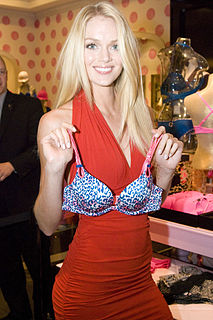A Quote by Victoria Osteen
It's no secret that in our society, and many before, people are trend followers. For some reason, they feel better about themselves if they are dressed in the latest fashion or have the newest tech gadget.
Related Quotes
Our students wanted to know everything: but only the newest theory seemed to them worth bothering with. Knowing nothing of the intellectual achievements of the past, they kept fresh and intact their enthusiasm for 'the latest thing'. Fashion dominated their interest: they valued ideas not for themselves but for the prestige that they could wring from them.
Some people make you feel better about living. Some people you meet and you feel this little lift in your heart, this 'Ah', because there's something in them that's brighter or lighter, something beautiful or better than you, and here's the magic: instead of feeling worse, instead of feeling 'why am I so ordinary?', you feel just the opposite, you feel glad. In a weird way you feel better, because before this you hadn't realised or you'd forgotten human beings could shine so.
The private motives of scientists are not the trend of science. The trend of science is made by the needs of society: navigation before the eighteenth century, manufacture thereafter; and in our age I believe the liberation of personality. Whatever the part which scientists like to act, or for that matter which painters like to dress, science shares the aims of our society just as art does.
Man today is fascinated by the possibility of buying, more, better, and especially, new things. He is consumption hungry... To buy the latest gadget, the latest model of anything that is on the market, is the dream of everybody, in comparison to which the real pleasure in use is quite secondary. Modern man, if the dared to be articulate about his concept of heaven, would describe a vision which would look like the biggest department store in the world.
Not many of us will be leaders; and even those who are leaders must also be followers much of the time. This is the crucial role. Followers judge leaders. Only if the leaders pass that test do they have any impact. The potential followers, if their judgment is poor, have judged themselves. If the leader takes his or her followers to the goal, to great achievements, it is because the followers were capable of that kind of response.
Childhood is less clear to me than to many people: when it ended I turned my face away from it for no reason that I know about, certainly without the usual reason of unhappy memories. For many years that worried me, but then I discovered that the tales of former children are seldom to be trusted. Some people supply too many past victories or pleasures with which to comfort themselves, and other people cling to pains, real and imagined, to excuse what they have become.
People are trying to build a society where they can talk across the aisle so to speak, and have civil discourse. At the same time we're trying to inform ourselves about what's really true so that we can make evidence based decisions that is better than superstition or rumor. But the fact is that people who use evidence based decision making have much better life outcomes, greater life satisfaction, they live longer, they make better personal and medical decisions, better financial decisions. But parallel to that is you can't reason somebody out of a position they didn't reason themselves into.
Fashion has been collected and exhibited for many years. People were picking up clothing of famous individuals, like Marie Antoinette's shoe or Napoleon's hat. That part of the resistance to having fashion in museums had to do with it being associated with femininity, and with the female body. Yet, as early as the 18th century, some people were recognizing that just as you collected art, you, might think about collecting fashion for museums, because it would provide insight into the way people thought about their lives and, and the way they envisioned themselves.






































